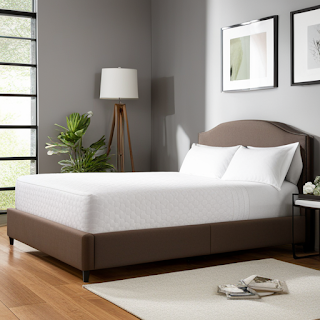Enhance Your Sleep Quality for a Productive Life
In today's fast-paced world, where productivity is highly valued, it's easy to overlook the importance of sleep. However, sleep quality plays a crucial role in our overall well-being and productivity. If you find yourself tossing and turning at night or waking up feeling tired, it's time to take steps to enhance your sleep quality. In this article, we'll explore practical strategies to help you achieve better sleep for a more productive life.
Table of Contents
- Understanding the Importance of Sleep
- Creating a Comfortable Sleep Environment
- Establishing a Consistent Sleep Schedule
- Incorporating Relaxation Techniques
- Balancing Diet and Sleep
- Limiting Screen Time Before Bed
- Physical Activity and Its Impact on Sleep
- Managing Stress and Anxiety
- The Role of Mattress and Pillows
- Exploring Natural Sleep Aids
- Avoiding Caffeine and Heavy Meals Before Bed
- Investing in Quality Bedding
- Practicing Mindfulness for Better Sleep
- Seeking Professional Help When Needed
- Conclusion: Embrace Restful Nights for Productive Days
1. Understanding the Importance of Sleep
Sleep is not just a period of rest; it's a fundamental process that allows our bodies and minds to rejuvenate. During sleep, our bodies repair tissues, consolidate memories, and regulate hormones. Lack of quality sleep can lead to decreased cognitive function, mood disturbances, and a weakened immune system.
2. Creating a Comfortable Sleep Environment
Design your sleep environment to promote relaxation. Keep your bedroom dark, quiet, and at a comfortable temperature. Investing in blackout curtains, white noise machines, and comfortable bedding can significantly enhance your sleep quality.
3. Establishing a Consistent Sleep Schedule
Our bodies have internal clocks that thrive on routine. Going to bed and waking up at the same time every day helps regulate your body's natural sleep-wake cycle. Consistency reinforces your body's internal clock and improves the quality of your sleep.
4. Incorporating Relaxation Techniques
Relaxation techniques like deep breathing, meditation, and progressive muscle relaxation can calm your mind and prepare your body for sleep. These techniques help reduce stress and anxiety, allowing you to fall asleep more easily.
5. Balancing Diet and Sleep
What you eat and drink can impact your sleep. Avoid heavy, spicy, or acidic meals close to bedtime. Opt for light snacks if you're hungry before bed. Additionally, limit your liquid intake to prevent disruptions from frequent trips to the bathroom.
6. Limiting Screen Time Before Bed
The blue light emitted by screens can interfere with your body's production of melatonin, a hormone that regulates sleep. Aim to avoid screens at least an hour before bedtime to signal to your body that it's time to wind down.
7. Physical Activity and Its Impact on Sleep
Regular physical activity promotes better sleep, but timing is key. Engaging in vigorous exercise close to bedtime can actually hinder sleep. Aim for moderate exercise earlier in the day to reap the sleep-enhancing benefits.
8. Managing Stress and Anxiety
Stress and anxiety can keep your mind racing at night. Practice stress-reduction techniques throughout the day, such as journaling, spending time in nature, or talking to a friend. Managing stress can lead to more peaceful nights.
9. The Role of Mattress and Pillows
Your sleep surface matters. Invest in a mattress and pillows that provide proper support and comfort for your body. The right sleep equipment can significantly improve your sleep quality.
10. Exploring Natural Sleep Aids
Certain herbs and supplements, such as chamomile, valerian root, and melatonin, have been shown to promote relaxation and improve sleep quality. Consult with a healthcare professional before trying any new supplements.
11. Avoiding Caffeine and Heavy Meals Before Bed
Caffeine and heavy meals can disrupt your sleep patterns. Avoid caffeine in the afternoon and evening, and opt for light, easily digestible meals at night.
12. Investing in Quality Bedding
Your bedding plays a role in temperature regulation and comfort. Invest in high-quality, breathable sheets and blankets to create an optimal sleep environment.
13. Practicing Mindfulness for Better Sleep
Mindfulness practices, such as meditation and gentle yoga, can help you let go of racing thoughts and relax your body. These practices encourage a state of calm conducive to falling asleep.
14. Seeking Professional Help When Needed
If you consistently struggle with sleep despite trying various strategies, consider seeking help from a sleep specialist. They can identify underlying issues and provide tailored solutions.
15. Conclusion: Embrace Restful Nights for Productive Days
Prioritizing sleep is a crucial step toward leading a productive and fulfilling life. By implementing these strategies and taking steps to enhance your sleep quality, you'll find yourself waking up refreshed, focused, and ready to tackle the day's challenges.
FAQs
1. How many hours of sleep do I need for optimal productivity? Most adults require 7-9 hours of sleep per night for optimal productivity and overall well-being.
2. Can technology really affect my sleep quality? Yes, the blue light emitted by screens can interfere with your sleep. Limit screen time before bed for better sleep.
3. Are natural sleep aids safe to use? Natural sleep aids can be helpful for some individuals, but it's important to consult with a healthcare professional before trying new supplements.
4. What should I do if I have consistent trouble falling asleep? If sleep issues persist, consider consulting a sleep specialist to identify any underlying problems and receive personalized guidance.
5. How long does it take to see improvements in sleep quality? Improvements in sleep quality can vary, but with consistent changes to your sleep habits, you may start noticing positive changes within a few weeks.




